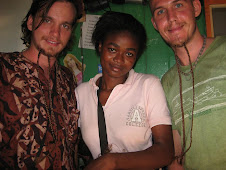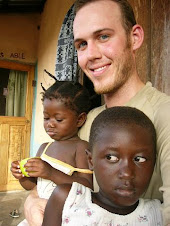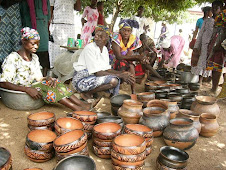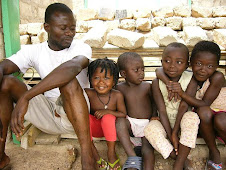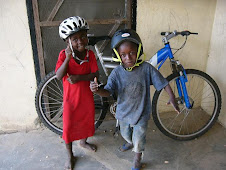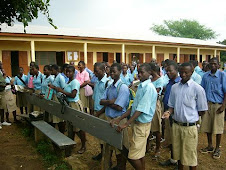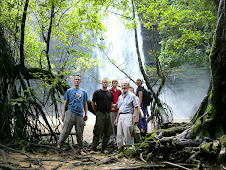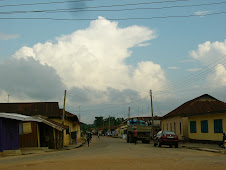I'll tell y'all a little about the traditional foods that people eat around here. Around here is northern Ghana, specifically the Upper East Region, because that's what I know and that's where I am. Other parts of the country do it a little differently, and the southern half of the country is significantly different culturally and culinarily, but you'll get the idea.
Ingredients are fairly limited around here, so people make due with what they have. A basic meal is usually made up of a dense carbohydrate and a vegetable based stew or soup. Basic ingredients available: tomatoes, onions, garlic, ginger, oil, groundnuts (that's peanuts), okra, peppe (little, very hot peppers). Another ingredient that is in most things is maggi cubes (commercial bullion seasoning) but I don't use that much.
The most typically northern food is called TZ (pronounced Tee Zed), which stands for "Toa Zhafi", the name in Hausa (widely spoken west african langauge). In Frafra, the food is called "sagebo" (pronounced sah-gay-boh. TZ is made from flour and water and can be made of maize, millet, or wheat flour. I like the maize TZ the best, and that's the kind that Robert makes most often, and is teaching me to make. Water is mixed with a small amount of flour and heated to boiling. Some of the flour water is removed and then lots of flour is added to the pot. Stirring continuously, the watery mixture is added a little at a time to make a thick cream-of-wheat consistancy. You have to stir constantly or it will burn, so it is cooked on the ground. Specially made metal hooks are put through the handles of the thick cast aluminium pot and the ends of the hooks are held with the feet, to keep the pot steady. Both hands are used to stir with a big wooden spoon/paddle. When the TZ is ready and the right thickness, it is poured into bowls and plates and allowed to cool. As it cools, it gets thicker and thicker until it can be eaten by breaking pieces off the main lump. It reminds me of semi solid cream-of-wheat cereal. It can also be made with slightly fermented flour water, or boiled seeds and tree bark can be added for a certain flavor that I don't really like.
When you eat it, you use your hands, of course, and only your right hand. I break off pieces of TZ and dip/scoop up some soup to go with it. TZ is best with okra stew or groundnut with Aleefu stew. Both of these are tomatoe based, with onion, peppe, and oil, okra strew has boiled cut up okra, which becomes very slimy and stringy. It's kind of like snot, and takes some getting used to. Okra stew is mostly only eated with TZ. Aleefu is a leaf (looks similar to a maple leaf) that is boiled and is similar to spinach when cooked. Canned fish is sometimes added to this one. Groundnut paste (peanut butter? it's not butter!) is added to make the soup smooth and creamy. Yum!
Rice balls are made by stirring rice cooked with a little extra water. It becomes a thick paste that is then made into balls (tennis to soft sized) and allowed to cool. It is eaten the same way as TZ with groundnut soup.
Banku is fermented corn dough formed into balls and eaten with the hands along with light soup or sometimes okra stew. Kenke is also fermented corn dough that is wrapped in corn husks (Gaa kenke) or plantain leaves (Fanti kenke) and boiled for some time. The names refer to the tribes that originally made them, but they are both common here and neither tribe is from the north. Kenke is eaten with a bit of tomanto stew or some peppe sauce (like salsa). Fufu is made by pounding boiled cassava, plantain, yam, or a combination of two until it becomes a dense sticky doughy lump. Fufu isn't northern, but people make it here sometimes. It's usually eaten with light soup, which is (as the name implies) a light tomato-based soup with plenty of oil and peppe.
Along with these foods, rice is very common: Plain rice with tomanto-vegetable stew, fried rice with a few veggies in it, and jolloff rice (rice cooked in a spicy tomato-fish sauce). Chicken, fish, or meat (usually goat) is normally offered as well. If you go to chop bar (food stand on the street) they may give you some "salad" with your rice which consists of shredded cabbage and lettuce, carrots, green peppers and some mayonaise-ish salad cream.
At home, when I cook "ghanaian" or when Robert cooks, we have rice and stew, TZ, and rice balls most of the time. When I cook for myself, I tend to make some variation on macaroni and cheese.
I'm eating well and enjoying the food here. An interesting note on "table manners": very different expectations here. When you eat with your hands, you naturally tend to hunch over your bowl. In Ghana, it is seen as rude to talk during a meal and very rude to reach into a communal bowl with your left hand. Also, you always bring food to your mouth with your right hand.
Try this next time you are eating with tolerant people. A rice dish is a good one to practice with: Hunch over your plate and put your left hand in your lap. Wash your right hand and put your right elbow on the table so that you can reach your food with your hand. Mix your food around and play with it a little (eating has now become a tactile experience!). Pick up some rice in your hand and hold it on your last three fingers. If you want, you can squeeze it to keep it together. Cock your wrist so that your last three fingers point towards your mouth and act like a spoon. Put the food in your mouth, push it off your fingers with your thumb. Lick your fingers often. You can eat anything this way, but if it is a very thin soup, just pick up the bowl and drink it after you've finished your TZ.
Food is fun, and I look forward to cooking and eating Ghanaian food with you, my loved ones, when next we meet. Take care of yourselves and eat well.
Love,
-Toby
Sunday, March 22, 2009
Saturday, March 14, 2009
More photos and stuff
photos on facebook, now with captions!
I saw an abyssinian roller the other day. beautiful. use google image search to find a better picture than i could ever take.
Anthony, another PCV in the Western Region told me that he saw one of his students wearing a SPASH 2002 t shirt. Amazing, that's even the year I graduated. Cloths from the US that no one wants in the thrift stores gets bundled up and sent to Africa. Here, people call it "obruni wayru" which means "dead white man's cloths". That's because people think the only reason some would get rid good cloths is if they died. I see people wearing all kinds of strange second hand clothes, mostly they have no idea what the thing means. I've seen some pretty funny ones too, like an old man wearing a pink shirt that says "That's Miss Bitch to You!" or a housewife wearing "Eat, Sleep, Fish" Shirts with other people's names on them are popular too. I guess that's true in the US as well.
Happy St. Patties day coming up. I celebrated this weekend with some Irish volunteers in Navrongo, Mary and Sarah. They sang Irish songs and taught us an Irish dance and Mary played a tune on a tin whistle, an Irish instrument. It was lots of fun. We drank and danced a lot.
Happy birthday, mom. I love you.
-Toby
I saw an abyssinian roller the other day. beautiful. use google image search to find a better picture than i could ever take.
Anthony, another PCV in the Western Region told me that he saw one of his students wearing a SPASH 2002 t shirt. Amazing, that's even the year I graduated. Cloths from the US that no one wants in the thrift stores gets bundled up and sent to Africa. Here, people call it "obruni wayru" which means "dead white man's cloths". That's because people think the only reason some would get rid good cloths is if they died. I see people wearing all kinds of strange second hand clothes, mostly they have no idea what the thing means. I've seen some pretty funny ones too, like an old man wearing a pink shirt that says "That's Miss Bitch to You!" or a housewife wearing "Eat, Sleep, Fish" Shirts with other people's names on them are popular too. I guess that's true in the US as well.
Happy St. Patties day coming up. I celebrated this weekend with some Irish volunteers in Navrongo, Mary and Sarah. They sang Irish songs and taught us an Irish dance and Mary played a tune on a tin whistle, an Irish instrument. It was lots of fun. We drank and danced a lot.
Happy birthday, mom. I love you.
-Toby
Saturday, February 21, 2009
A typical day
Normally, I wake up around 6:30 or 7:00 am, it's light out by then. I often hear my housemates, Robert and Headmaster, up before then, sometime they pray or play the radio very loud. I also hear the students who come to the house in the mornings. There are two form 1 girl students who come to the house three times a week to sweep, clean, and sometimes do dishes. This is a system that my housemates want to be in place, and I've gotten used to it. Louisa and Mamuna are nice and I've gotten to know them so that I don't feel uncomfortable finding them in the kitchen when I stagger in to look for breakfast. Other students often come in the morning looking for the buckets so they can fetch water for us, usually as a punishment imposed by the prefects. That can be annoying, but I manage.
I usually take tea for breakfast. In Ghana, tea means anything you mix with hot water, so I usually have hot chocolate. Lipton yellow tea is also available, but we don't have any Nescafe in the house. With my tea I take bread with groundnut paste and fruit jam, or oats with some dried fruit depending on what's available. On days when I have more time, I make pancakes or french toast and eat it with my dad's real maple syrup. Yum! I offer to Robert sometimes, but he's not as excited about breakfast foods as I am.
After breakfast, I go to school. I walk out my door, walk 30 feet and I'm at the school. First period begins at 8:00am, but the students are usually expected to arrive by 6:30 or 7:00. I teach 19 40-minute periods a week, as long as other events don't interrupt classes, which they frequently do. Staff meetings, Assemblies for Moral Talks, school elections, and sporting events all normally take place during normal school time. I meet my classes and teach my lessons, and hang out in the Staff Common Room or under the Tree with other teachers when I'm not teaching.
I eat lunch during the long break (20 min) at the "Common Market", which is another tree near the school that some ladies sit under and sell food. I usually have fried yam or kosi (fried bean cake) with peppe, like salsa. Food you buy from a vendor like this is called "chop", and it's used like a verb too: I will go and chop some kosi. When you buy, you order by the price, not the quantity you want. I say, "Wuntenga, la-ang wani? Oh, la me ang sunga. M-bene fu may, bo ma kosi 2 tousand busa 2 tousand. M-puheya." or (translated) "Good afternoon, how are you? Oh, I am fine also. Please, give me kosi 2 thousand and yam 2 thousand? Thank you." I spend the equivilant of 20 or 30 cents usually. Too much fried food...tasty though.
Sometimes I teach in the afternoon, but the students get restless and some of them inevitably dodge home early. They get tired and hungry, many don't have money for chop, and there's no water at the school either. Classes end and closing assembly is at 2:30. The students gather, sing, pray and announcements are made. I often stay for closing and make announcements about whatever is going on. Most staff don't. There are also Opening assemblies Mon, Wed, and Fri, at 7:30am, but I don't go to those too often.
When school closes, the students go home but sometimes some come back for extra classes. I go to my house and relax, play the guitar, read or prepare lessons for the following day. I talk with Robert about what we will cook for dinner. If it is a Sirigu market day, I go into the market to buy food and talk to the market ladies. I really enjoy the market, because it gives me a chance to socialize and practice my language skills. Lots of people know me there, and they are very friendly. I also take my phone and ipod to charge at Bismark's house because he has electricity. His kids are fun to play with too.
I ride home by dark usually, and Robert or I cook supper. It's dark by 6:30pm, so we often cook by headlamp or candlelight. Robert cooks more often than I do and he's a good cook. Headmaster often goes into town in the afternoon, but sometimes comes home and eats supper at the house, although not with us. It is not typical in Ghana to gather to eat, usually people eat on their own.
After eating, doing dishes, feeding the dog, and listening to the radio, It's getting late and I'm getting tired. I bath in the dark, then light some candles in my room and read, listen to music, play guitar, or do more school work. I'm usually in bed by 9:00pm, and often asleep by 10:00pm.
That's a typical school day for me here in Ghana. Not very exciting, but the time goes fast enough. I use my weekends for trips into Bolga, doing my laundry, or visiting friends.
All in all, it's going pretty well. Love to all my friends and family back home. I miss you all.
Love,
-Toby
PS. There's a few more new photos on facebook. find link on previous blog post. -tk
I usually take tea for breakfast. In Ghana, tea means anything you mix with hot water, so I usually have hot chocolate. Lipton yellow tea is also available, but we don't have any Nescafe in the house. With my tea I take bread with groundnut paste and fruit jam, or oats with some dried fruit depending on what's available. On days when I have more time, I make pancakes or french toast and eat it with my dad's real maple syrup. Yum! I offer to Robert sometimes, but he's not as excited about breakfast foods as I am.
After breakfast, I go to school. I walk out my door, walk 30 feet and I'm at the school. First period begins at 8:00am, but the students are usually expected to arrive by 6:30 or 7:00. I teach 19 40-minute periods a week, as long as other events don't interrupt classes, which they frequently do. Staff meetings, Assemblies for Moral Talks, school elections, and sporting events all normally take place during normal school time. I meet my classes and teach my lessons, and hang out in the Staff Common Room or under the Tree with other teachers when I'm not teaching.
I eat lunch during the long break (20 min) at the "Common Market", which is another tree near the school that some ladies sit under and sell food. I usually have fried yam or kosi (fried bean cake) with peppe, like salsa. Food you buy from a vendor like this is called "chop", and it's used like a verb too: I will go and chop some kosi. When you buy, you order by the price, not the quantity you want. I say, "Wuntenga, la-ang wani? Oh, la me ang sunga. M-bene fu may, bo ma kosi 2 tousand busa 2 tousand. M-puheya." or (translated) "Good afternoon, how are you? Oh, I am fine also. Please, give me kosi 2 thousand and yam 2 thousand? Thank you." I spend the equivilant of 20 or 30 cents usually. Too much fried food...tasty though.
Sometimes I teach in the afternoon, but the students get restless and some of them inevitably dodge home early. They get tired and hungry, many don't have money for chop, and there's no water at the school either. Classes end and closing assembly is at 2:30. The students gather, sing, pray and announcements are made. I often stay for closing and make announcements about whatever is going on. Most staff don't. There are also Opening assemblies Mon, Wed, and Fri, at 7:30am, but I don't go to those too often.
When school closes, the students go home but sometimes some come back for extra classes. I go to my house and relax, play the guitar, read or prepare lessons for the following day. I talk with Robert about what we will cook for dinner. If it is a Sirigu market day, I go into the market to buy food and talk to the market ladies. I really enjoy the market, because it gives me a chance to socialize and practice my language skills. Lots of people know me there, and they are very friendly. I also take my phone and ipod to charge at Bismark's house because he has electricity. His kids are fun to play with too.
I ride home by dark usually, and Robert or I cook supper. It's dark by 6:30pm, so we often cook by headlamp or candlelight. Robert cooks more often than I do and he's a good cook. Headmaster often goes into town in the afternoon, but sometimes comes home and eats supper at the house, although not with us. It is not typical in Ghana to gather to eat, usually people eat on their own.
After eating, doing dishes, feeding the dog, and listening to the radio, It's getting late and I'm getting tired. I bath in the dark, then light some candles in my room and read, listen to music, play guitar, or do more school work. I'm usually in bed by 9:00pm, and often asleep by 10:00pm.
That's a typical school day for me here in Ghana. Not very exciting, but the time goes fast enough. I use my weekends for trips into Bolga, doing my laundry, or visiting friends.
All in all, it's going pretty well. Love to all my friends and family back home. I miss you all.
Love,
-Toby
PS. There's a few more new photos on facebook. find link on previous blog post. -tk
Wednesday, January 28, 2009
School stuff
My school, Sirigu Senior High School, let me tell you about my school. First let me tell you about the educational system in Ghana. ok, here we go...
Ghana Education Services (GES) is a the branch of the gov't that we deal with and the system is very centralized, overall. There are very few private schools, especially at the primary and secondary levels. Students go to Primary school for 6 years, starting at about age 5 (depends on the parents, if they need them at home). Some kids don't go to school at all, but Primary is free except for some school fees, cost of uniforms, books, pencils, etc. (There ain't no such thing as a free lunch.) Each year is called a "Form" instead of a grade, so we say a first year student is a P1 student. Uniforms for Primary School students is usually brown on the bottom, yellow/tan on the top. There is also Nursury for little kids before Primary, but that seems to be mostly in more urban areas. Little ones wear cute checked uniforms in different colors.
After Primary, students go to Junior Secondary School (JSS). JSS has 3 forms, and the Form 3 students help organize things with a prefect system (like in Harry Potter!). Their uniforms around here are blue bottom and yellow top, except the prefects, who wear tan bottoms and white tops. It's a day school, so the students go home at the end of the day, as in the US. At the end of JSS, the form 3 students take a standardized test called BECE that determines which Senior High School they will go to. They list preferences and if their scores are good, they go to a good school. If their scores are okay, they come to a smaller, not as good school (like mine) and if their scores are not so good at all, they go and work on the family farm and don't go to SS.
They have just added a fourth year to SS, making it SHS, so I teach Form 2 and Form 3 Integrated Science. Prefects, seniors chosen by their peers, keep the other students in line and do a lot to keep the school running. Around here, uniforms are tan on bottom and light blue on top, prefects wear pink on top. Most SHS schools are boarding schools that house and feed the students as well as teach them. Usually, students want to go to a big school that is at least a little ways from their home town. The attitude is similar to HS seniors in the US looking at colleges-they want to move away from home and all that. Boarding schools have higher school fees, more students, and more buildings. Sirigu Senior High School is a day school, which is uncommon for SHS. It has no electricity or running water; a borehole to fetch water is a 5 min walk away. It is not as expensive (annual school fees are about $50) and there are many fewer students than other schools. Many of my students are from the area, and still live at home. Others rent rooms in the village and have to feed themselves. They want the school to become a boarding school, but that will take a lot of development at this point.
In Ghana, the students normally stay in the same classroom and the teachers move from room to room. The rooms are very sparce, at my school, there are only desks for some students, so the rest have to bring their own. I teach in a open air classroom, tin roof, cement walls and open windows with shutters. (That is actually a basic description of a lot of buildings here) The blackboard is smooth cement on the wall. The students occasionally paint it with battery acid (not a joke) to make it black, but it comes off on my hands and only lasts a week or so. The classes are small at my school, 10 to 25 students. The school offers different "courses" similar to majors in college in US. Sirigu SHS offers Business, General Arts, and Agric. Students sit with their form mates who are offering the same course and a class captain keeps track of the class.
At the end of 3rd year (will soon be 4th year) the seniors, or candidates take a massive standardized test for all of English-speaking West Africa called the WASSCE. Basically, it determines weather they can go to university, technical school or any other tertiary ed. We spend a lot of time teaching to the test, as it is so important.
Looking back at what I've just written, it is informative but fairly dry. I'll write some more interesting and detailed stuff another time. Overall, I like my school and I am happy to be there. The students are what really keep me going. They are eager to learn and try hard, even though their obstacles are many.
Love,
Toby
Ghana Education Services (GES) is a the branch of the gov't that we deal with and the system is very centralized, overall. There are very few private schools, especially at the primary and secondary levels. Students go to Primary school for 6 years, starting at about age 5 (depends on the parents, if they need them at home). Some kids don't go to school at all, but Primary is free except for some school fees, cost of uniforms, books, pencils, etc. (There ain't no such thing as a free lunch.) Each year is called a "Form" instead of a grade, so we say a first year student is a P1 student. Uniforms for Primary School students is usually brown on the bottom, yellow/tan on the top. There is also Nursury for little kids before Primary, but that seems to be mostly in more urban areas. Little ones wear cute checked uniforms in different colors.
After Primary, students go to Junior Secondary School (JSS). JSS has 3 forms, and the Form 3 students help organize things with a prefect system (like in Harry Potter!). Their uniforms around here are blue bottom and yellow top, except the prefects, who wear tan bottoms and white tops. It's a day school, so the students go home at the end of the day, as in the US. At the end of JSS, the form 3 students take a standardized test called BECE that determines which Senior High School they will go to. They list preferences and if their scores are good, they go to a good school. If their scores are okay, they come to a smaller, not as good school (like mine) and if their scores are not so good at all, they go and work on the family farm and don't go to SS.
They have just added a fourth year to SS, making it SHS, so I teach Form 2 and Form 3 Integrated Science. Prefects, seniors chosen by their peers, keep the other students in line and do a lot to keep the school running. Around here, uniforms are tan on bottom and light blue on top, prefects wear pink on top. Most SHS schools are boarding schools that house and feed the students as well as teach them. Usually, students want to go to a big school that is at least a little ways from their home town. The attitude is similar to HS seniors in the US looking at colleges-they want to move away from home and all that. Boarding schools have higher school fees, more students, and more buildings. Sirigu Senior High School is a day school, which is uncommon for SHS. It has no electricity or running water; a borehole to fetch water is a 5 min walk away. It is not as expensive (annual school fees are about $50) and there are many fewer students than other schools. Many of my students are from the area, and still live at home. Others rent rooms in the village and have to feed themselves. They want the school to become a boarding school, but that will take a lot of development at this point.
In Ghana, the students normally stay in the same classroom and the teachers move from room to room. The rooms are very sparce, at my school, there are only desks for some students, so the rest have to bring their own. I teach in a open air classroom, tin roof, cement walls and open windows with shutters. (That is actually a basic description of a lot of buildings here) The blackboard is smooth cement on the wall. The students occasionally paint it with battery acid (not a joke) to make it black, but it comes off on my hands and only lasts a week or so. The classes are small at my school, 10 to 25 students. The school offers different "courses" similar to majors in college in US. Sirigu SHS offers Business, General Arts, and Agric. Students sit with their form mates who are offering the same course and a class captain keeps track of the class.
At the end of 3rd year (will soon be 4th year) the seniors, or candidates take a massive standardized test for all of English-speaking West Africa called the WASSCE. Basically, it determines weather they can go to university, technical school or any other tertiary ed. We spend a lot of time teaching to the test, as it is so important.
Looking back at what I've just written, it is informative but fairly dry. I'll write some more interesting and detailed stuff another time. Overall, I like my school and I am happy to be there. The students are what really keep me going. They are eager to learn and try hard, even though their obstacles are many.
Love,
Toby
Saturday, January 24, 2009
Monday, January 19, 2009
Vacation is over
It seems like it's been a long time since I've been on a normal school calender. That's because it has been. School is finally starting again and I'll get my groove back and do even better than the first term. Just give me a bit to remember how to teach.
Anyway, the break has been relaxing and interesting for the most part. The elections all happened without incident, although PC did extend the standfast because one district had to revote. Eventually the Electoral Commission announced that the NDC had won and that John Evans Atta-Mills would be the next prez of Ghana. That's fine with me, and I'm glad to see that most Ghanaians are happy or at least content with it. Change is good, right?
I celebrated Christmas small with Bismark's family, but didn't do anything too exciting. It didn't really feel much like Christmas in the states, no snow, no Santa, no commercialism, no lights. Plenty of Jesus, though. Overall, it seems that people here don't celebrate Xmas (that's how they say it) as frantically as we do in 'merica, even though there are lots of christians. One church did have a camp-out sing-a-long near my school. For about three nights in a row, they sang and danced and preached, and people came from other towns to participate. It was fun to see, and a bunch of my students were there. They were impressed that I could speak Frafra. One thing that was interesting is that in Bolga, there were groups of kids roaming around and wishing people merry christmas. They were all dressed up in their best cloths and had their hair slicked or fancied with pomade. It was sort of like a cross between caroling and trick-or-treating. They were expecting to be given candy after delivering their holiday greetings, but since I wasn't prepared, I just wished them merry christmas back.
New Years was cool, too. I went to a festival in Natugia, a nearby village. There were lots and lots of people there and different groups danced and drummed and recieved monies. People were selling candy, balloons and little cheap toys, and there was plenty of kids running around. There was also plenty of alcohol, but that's how you celebrate around here. The party went late, but I didn't stay too long once it got dark. I usually go to bed pretty early here.
Finally, after standfast ended, I went to visit my friend and housemate Robert's village. It was very nice and I met all his family and friends and the family of his fiancee. We visited his alma mater, watched crazy Nigerian movies, and drank pito (locally brewed from millet, it's good) with some old men. Then we traveled together back to Sirigu for a day and then left for In-Service Training in Kukurantumi.
Getting to IST was a bit of adventure. We stayed over in Tamale, and left on an Accra bound STC bus in the morning, but the bus broke down outside of Kintampo (3 hrs out of 10). We ended up waiting for 7 hrs as they tried to fix the bus and failed. It was a drag, but some kids kept me company as I finished my paperback and started writing my own. Finally, another bus arrived and we got on that one and continued our journey. The original plan was to drop at Bunso and get to Kukurantumi from there, but that wouldn't have worked to well at 2 AM, so we went all the way to Accra, slept a few hours in the bus terminal, and got up at 5 AM to travel back up to Koforidua and then to Kuku. It worked out alright in the end, only that we arrived a day late to the training conference. I was hungry, tired, and stinky when we got there, but all three were remedied eventually. The conference was good and it was nice to see friends again, even though it had only been a month since All Vol. We even got a chance to play a little of my GRPG (dorky fun).
Now I'm en route home again and have to start thinking about Integrated Science. I'll post some pictures soon, too.
Love,
Toby
Anyway, the break has been relaxing and interesting for the most part. The elections all happened without incident, although PC did extend the standfast because one district had to revote. Eventually the Electoral Commission announced that the NDC had won and that John Evans Atta-Mills would be the next prez of Ghana. That's fine with me, and I'm glad to see that most Ghanaians are happy or at least content with it. Change is good, right?
I celebrated Christmas small with Bismark's family, but didn't do anything too exciting. It didn't really feel much like Christmas in the states, no snow, no Santa, no commercialism, no lights. Plenty of Jesus, though. Overall, it seems that people here don't celebrate Xmas (that's how they say it) as frantically as we do in 'merica, even though there are lots of christians. One church did have a camp-out sing-a-long near my school. For about three nights in a row, they sang and danced and preached, and people came from other towns to participate. It was fun to see, and a bunch of my students were there. They were impressed that I could speak Frafra. One thing that was interesting is that in Bolga, there were groups of kids roaming around and wishing people merry christmas. They were all dressed up in their best cloths and had their hair slicked or fancied with pomade. It was sort of like a cross between caroling and trick-or-treating. They were expecting to be given candy after delivering their holiday greetings, but since I wasn't prepared, I just wished them merry christmas back.
New Years was cool, too. I went to a festival in Natugia, a nearby village. There were lots and lots of people there and different groups danced and drummed and recieved monies. People were selling candy, balloons and little cheap toys, and there was plenty of kids running around. There was also plenty of alcohol, but that's how you celebrate around here. The party went late, but I didn't stay too long once it got dark. I usually go to bed pretty early here.
Finally, after standfast ended, I went to visit my friend and housemate Robert's village. It was very nice and I met all his family and friends and the family of his fiancee. We visited his alma mater, watched crazy Nigerian movies, and drank pito (locally brewed from millet, it's good) with some old men. Then we traveled together back to Sirigu for a day and then left for In-Service Training in Kukurantumi.
Getting to IST was a bit of adventure. We stayed over in Tamale, and left on an Accra bound STC bus in the morning, but the bus broke down outside of Kintampo (3 hrs out of 10). We ended up waiting for 7 hrs as they tried to fix the bus and failed. It was a drag, but some kids kept me company as I finished my paperback and started writing my own. Finally, another bus arrived and we got on that one and continued our journey. The original plan was to drop at Bunso and get to Kukurantumi from there, but that wouldn't have worked to well at 2 AM, so we went all the way to Accra, slept a few hours in the bus terminal, and got up at 5 AM to travel back up to Koforidua and then to Kuku. It worked out alright in the end, only that we arrived a day late to the training conference. I was hungry, tired, and stinky when we got there, but all three were remedied eventually. The conference was good and it was nice to see friends again, even though it had only been a month since All Vol. We even got a chance to play a little of my GRPG (dorky fun).
Now I'm en route home again and have to start thinking about Integrated Science. I'll post some pictures soon, too.
Love,
Toby
Tuesday, December 23, 2008
Long time, no write?
Hey all,
It's been a while, and I'm fine. Here's an update
The elections went well, there was almost no violence or problems. Unfortunately, the vote was too close and no candidate got over 50% so they need to do a run off vote for the two leading candidates. The vote is scheduled for Dec 28, so for safety, PC has put us all on standfast during the holidays around the vote. (Standfast=stay at site). It's a drag for people who had plans to travel, but I didn't plan anything, so I'm okay. We'll see how the next one goes, I'm pretty confident that it will be a good election.
The All Volunteer Conference was the week before last. I prepared end-of-term exams for my classes before I traveled down to Bunso to hang out with all the other PCV's in Ghana. It was really fun, and I met lots of great people, and even learned some stuff at the PEPFAR workshops. The best part was the PC Prom. I made myself a bowtye out of water sachets and since the theme was "Ghana Fabulous" everyone wore their best/worst Ghana garb. We drank and danced and had a blast. Check out pics on facebook, Ming "the Real Man" took some great ones. We also had an entertainment night, sort of like a talent show followed by another dance. Kyle and I sang some Steven Lynch songs. If you know anything about Steven Lynch, you know that they were funny and vulgar. Good times!
After the conference, I traveled with Kyle and Katharine to his site and then to the beach at Adda Foah. We met Jen, Sara, and Caroline and had a great time. It was beautiful, although not too clean. There was plenty of trash on the sand and in the water, and in places, we saw people "praying" on the beach in a squatting position. I think you can figure it out. Overall the beach was awesome and relaxing and I only got minorly burnt. We took a long walk along the beach, and encountered some fishermen and women pulling in a huge net. They had all sorts of fish in there, I wish I knew the names. They also had some cool sea snakes, pufferfish, small lobsters, and lots of trash. Nothing got out alive and even the smallest fish was collected. The fishers gave us two small lobsters and we took them back to the "resort" and had them cook them up for us for supper. We also caught a bunch of little crabs who wanted to hide in holes on the shore but weren't fast enough. We put them in a plastic bag and ate them, too! It was really fun and I realized that I really needed the break.
After a few days, I made my way back north and am now settled back in Sirigu and getting to know my new neighbor Shauna, who is a Small Enterprise Development pcv who lives just close to me. She is way cool and we are learning how to play the guitar together.
I send my good holiday vibes to everyone, If you see someone I know and like, give them a hug for me. (I hope this will facilitate a lot of hugging, as I know and like a lot of people). Thanks especially to my family in Seattle for all the awesome care packages! I have now amassed a substantial supply of cliff bars, candy and powdered cheese. It's just what I wanted for Christmas!
Also, new random pictures here.
all the best,
Toby
PS. I love you.
It's been a while, and I'm fine. Here's an update
The elections went well, there was almost no violence or problems. Unfortunately, the vote was too close and no candidate got over 50% so they need to do a run off vote for the two leading candidates. The vote is scheduled for Dec 28, so for safety, PC has put us all on standfast during the holidays around the vote. (Standfast=stay at site). It's a drag for people who had plans to travel, but I didn't plan anything, so I'm okay. We'll see how the next one goes, I'm pretty confident that it will be a good election.
The All Volunteer Conference was the week before last. I prepared end-of-term exams for my classes before I traveled down to Bunso to hang out with all the other PCV's in Ghana. It was really fun, and I met lots of great people, and even learned some stuff at the PEPFAR workshops. The best part was the PC Prom. I made myself a bowtye out of water sachets and since the theme was "Ghana Fabulous" everyone wore their best/worst Ghana garb. We drank and danced and had a blast. Check out pics on facebook, Ming "the Real Man" took some great ones. We also had an entertainment night, sort of like a talent show followed by another dance. Kyle and I sang some Steven Lynch songs. If you know anything about Steven Lynch, you know that they were funny and vulgar. Good times!
After the conference, I traveled with Kyle and Katharine to his site and then to the beach at Adda Foah. We met Jen, Sara, and Caroline and had a great time. It was beautiful, although not too clean. There was plenty of trash on the sand and in the water, and in places, we saw people "praying" on the beach in a squatting position. I think you can figure it out. Overall the beach was awesome and relaxing and I only got minorly burnt. We took a long walk along the beach, and encountered some fishermen and women pulling in a huge net. They had all sorts of fish in there, I wish I knew the names. They also had some cool sea snakes, pufferfish, small lobsters, and lots of trash. Nothing got out alive and even the smallest fish was collected. The fishers gave us two small lobsters and we took them back to the "resort" and had them cook them up for us for supper. We also caught a bunch of little crabs who wanted to hide in holes on the shore but weren't fast enough. We put them in a plastic bag and ate them, too! It was really fun and I realized that I really needed the break.
After a few days, I made my way back north and am now settled back in Sirigu and getting to know my new neighbor Shauna, who is a Small Enterprise Development pcv who lives just close to me. She is way cool and we are learning how to play the guitar together.
I send my good holiday vibes to everyone, If you see someone I know and like, give them a hug for me. (I hope this will facilitate a lot of hugging, as I know and like a lot of people). Thanks especially to my family in Seattle for all the awesome care packages! I have now amassed a substantial supply of cliff bars, candy and powdered cheese. It's just what I wanted for Christmas!
Also, new random pictures here.
all the best,
Toby
PS. I love you.
Subscribe to:
Posts (Atom)

